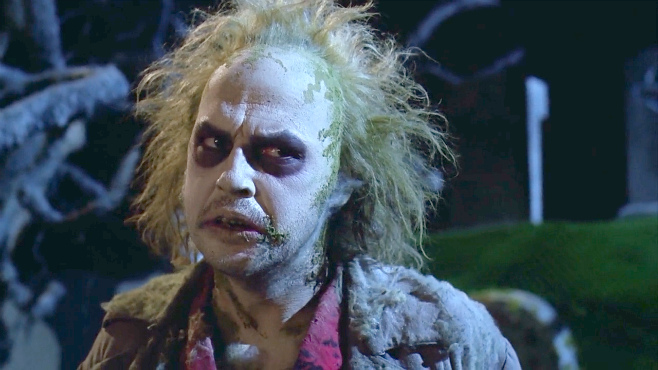Review: Beetlejuice (1988)
Beetlejuice is the epitome of Tim Burton’s art and one of his best films. With his second feature, working from a screenplay by Michael McDowell and Warren Skaaren, Burton essentially established the mode that has dominated his work ever since—a mix of satire, black comedy, Gothicism, horror, expressionism, and camp.
The movie also displays Burton’s crowning weakness: an inability to sustain and develop a narrative. Simply put, the story is not the strong point of Beetlejuice. Sure, the premise is undeniably novel: when a nice couple (Alec Baldwin and Geena Davis) die and become ghosts, they enlist the help of the crazy “bio-exorcist” Betelgeuse (Michael Keaton) in order to scare the insufferable new residents (Jeffrey Jones and Catherine O’Hara) out of their house. But that premise is pure “high concept”: succinct and interesting, but designed more to generate humorous situations and entertaining set pieces than to tell an involving story or create well-developed characters. This goes to show that Tim Burton has always been a commercially-savvy and very-Hollywood filmmaker.
In Beetlejuice, however, the insubstantial story adds to the film’s manic and frenetically imaginative tone, which is one of its most appealing qualities. The worlds Burton creates in his films tend to feel as though they’ve been made on the fly—that they’re at the whim of Burton’s every fancy. For example, in Beetlejuice Burton gives us an inexplicable yet arresting vision of sandworms on one of the moons of Saturn, just outside the door if the ghosts leave their home. In this sense, Beetlejuice seems like it’s sprung from the mind of a slightly deranged yet brilliant boy. Burton’s imagination was still aflame, burning strongly if strangely. This is before his style solidified into a kind of weird brand to be stamped onto conventional narratives (as in the case of Burton’s tired Alice in Wonderland).
For all my talk about Burton though, it is really Michael Keaton who makes this movie of lasting appeal. I think Keaton’s Betelgeuse (pronounced “Beetle Juice”) is the best kook Burton ever put on screen, surpassing anything Johnny Depp has ever done for him. With wild, dirty green hair, shadowy eye sockets, and sickly marks along the side of his head and neck, Betelgeuse is memorable just to look at. But Keaton’s performance nails it: he makes his dead weirdo never stop shifting and moving jerkily, bugging his eyes and licking his lips, always trying to wheedle a deal with people in an aggressive, pushy, used-car-salesman sort of way.
Like Anthony Hopkins’ Hannibal Lecter in The Silence of the Lambs, Keaton’s Betelgeuse is the star of the movie despite his limited screen time. And like in Lambs, the rest of the film builds up Keaton’s performance, since everyone spends a great deal of time talking about the character when he’s not around. His main entrance (the camera hides him when he’s reading the paper during his first scene and we only see him head-on on a television screen before this moment) is one of those great on-screen flights of manic energy. It reminds me of when Robin Williams first gets on the air in Good Morning, Vietnam, or when his Genie busts out of the lamp in Aladdin, expect that Keaton’s Betelgeuse is much more vile and perverted than anything Robin Williams did in those movies. Keaton’s performance also puts the lie to the idea that the much-touted Birdman parallels Keaton’s career, for Keaton had a successful comedic career before and after Batman.
The rest of the cast is exceptional, creating a collection of memorable humorous types. Alec Baldwin and Geena Davis make the nice ghost couple, Adam and Barbara Maitland, endearing and just a little quirky, when the characters could easily have been forgettable. Jeffrey Jones and Catherine O’Hara are also great as the insufferable new residents, Charles and Delia Deetz. Jones makes his New York real estate magnate both likeable in his efforts to find some peace and quiet in New England and annoying in his money-grubbing real estate schemes. O’Hara’s stepmother, with her hideous trendy “taste” and an intense desperation to show off to her artsy urban friends, again achieves the fine line of irritation (at first) and understanding (eventually). Winona Ryder is Lydia Deetz, the gothic teenage daughter who is able to see the ghosts. The weird outsider with insight, she’s sort of the quintessential Tim Burton child character, but Lydia thankfully doesn’t escape the film’s satiric barbs. Lastly, Glenn Shadix makes Otho, Delia’s artsy know-it-all consultant, into yet another funny, vivid, if not fully three dimensional, character.
It is to the film’s testament that scenes such as the Maitlands in the underworld or the dinner party possessed dance are great fun even if the brilliant Betelgeuse isn’t in them. In fact, the only weak aspect of this film might be the underdeveloped story.
Ed Wood has greater emotional depth and Sleepy Hollow has more impressive mise en scène, but almost every feature Burton’s made since Beetlejuice resembles it in one way or another. But if it’s Burton’s touchstone, it’s also the highpoint of Michael Keaton’s career.
9 out of 10
Beetlejuice (1988, USA)
Directed by Tim Burton; screenplay by Michael McDowell and Warren Skaaren; starring Alec Baldwin, Geena Davis, Michael Keaton, Catherine O’Hara, Jeffrey Jones, Glenn Shadix, and Winona Ryder.
